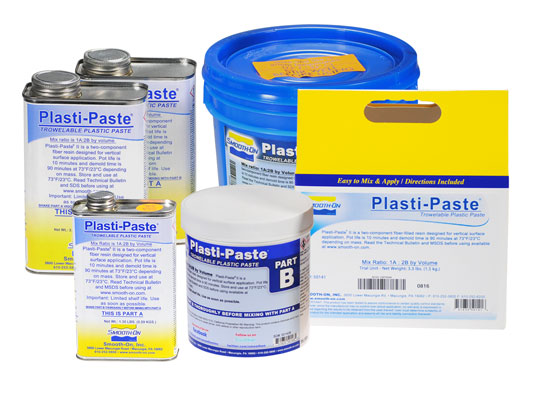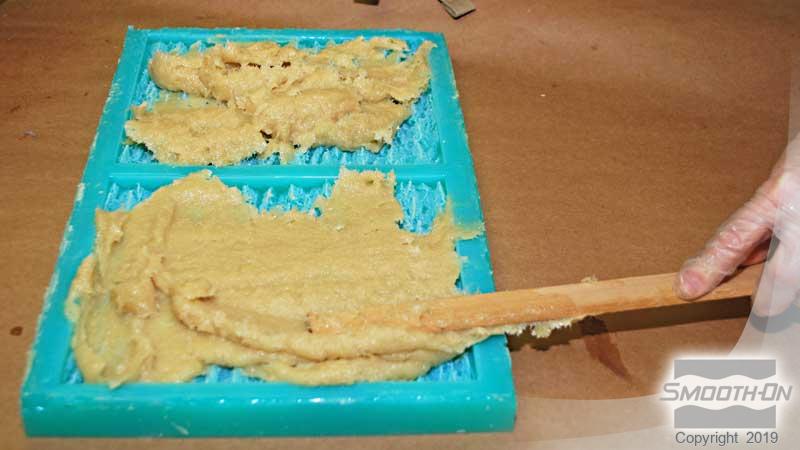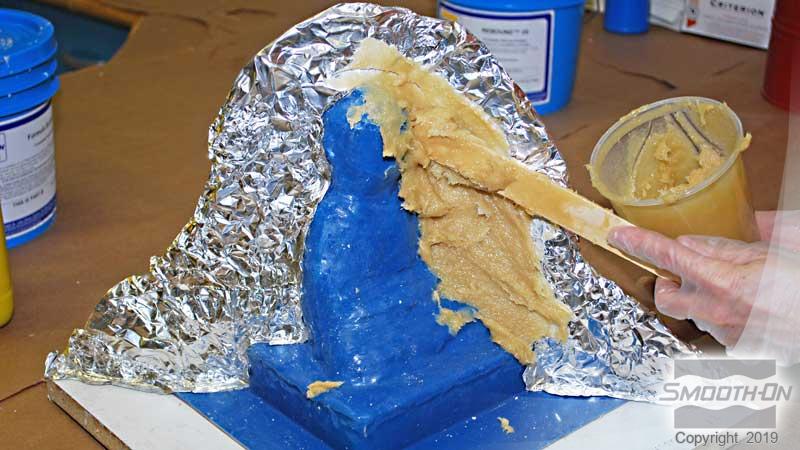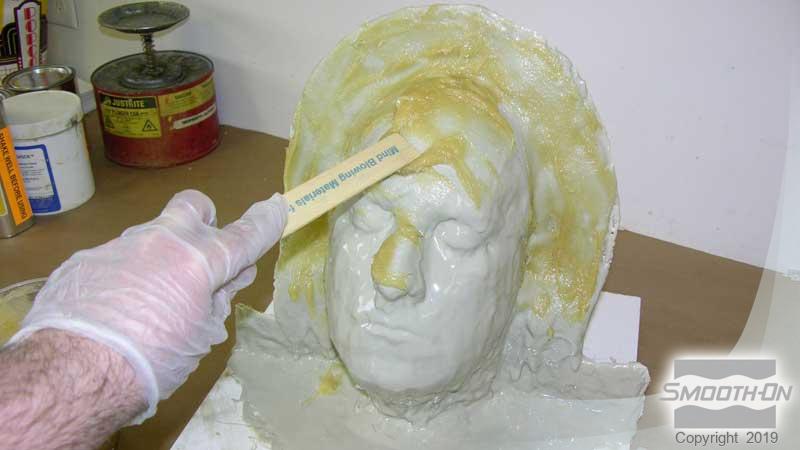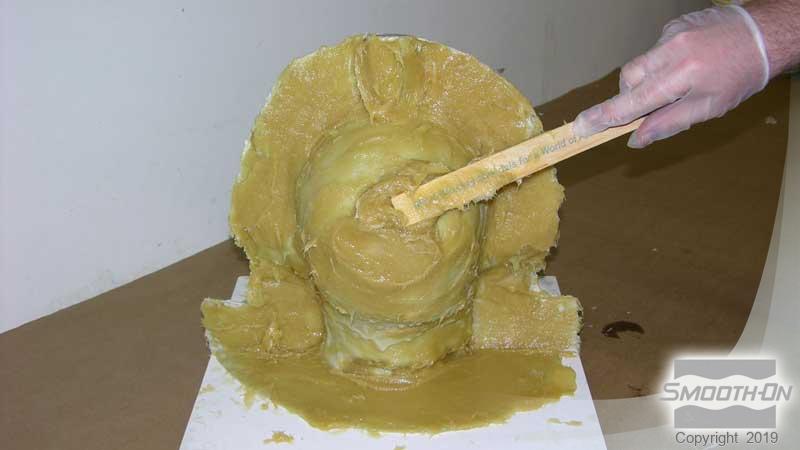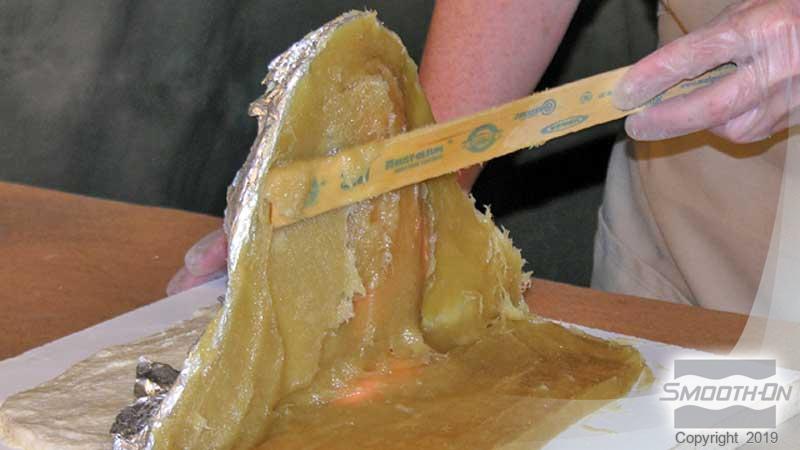Plasti-Paste™
Plasti-Paste™ is a two component fiber resin that is designed for vertical surface application. Part A is a liquid and Part B is a paste. Mix ratio is 1A : 3B by volume (41A:100B by weight). It has no odor and pot life is 8 – 10 minutes depending on mass. Demold time (can be handled) is about 90 minutes depending on mass. Plasti-Paste™ holds a vertical surface without sagging and cures to a strong, durable and lightweight plastic. Suitable as a mother mold / support shell (reinforces shape of rubber mold during casting). Can be pigmented with So-Strong™ color tints from Smooth-On. Add Ure-Fil™ 9 as an extender or for special effects.
Instructions
Preparation – Materials should be stored and used in at room temperature (73° F / 23° C). This product has a limited shelf life and should be used as soon as possible. Mixing should be done in a well ventilated area. Wear safety glasses, long sleeves and rubber gloves to minimize contamination risk. If making a 2 or more piece mother mold, apply appropriate shim apparatus to rubber mold exterior.
Because no two applications are quite the same, a small test application to determine suitability for your project is recommended if performance of this material is in question.
Applying A Release Agent – This product is adhesive and will bond to many surfaces. A sealer followed by a release agent is necessary to facilitate demolding when applying as a mother mold over a cured mold rubber. Use Sonite™ Wax followed by a coating of Universal™ Mold Release or Ease Release™ 200 release agent. A liberal coat of release agent should be applied onto all surfaces that will contact the plastic. You can also apply aluminum foil as a barrier over the surface followed by an application of mold release agent.
PRE-MIX Part B Before You Start – Part B is a thick paste containing oil that needs to be pre-mixed before being dispensed into measuring container. Dig deep to re-disperse oil & paste components that may have separated.
Measuring – The components of Plasti-Paste™ requires two different sized containers. The first will be used for measuring out amounts of Part A and Part B. The second should be large enough to contain both components and allow thorough mixing. IMPORTANT: Shelf life of Part A (Yellow Container) is reduced after opening. Remaining product should be used as soon as possible. XTEND-IT™ Dry Gas Blanket will prolong shelf life of unused liquid urethanes.
Mixing – Mix Ratio is 1A:3B by volume (41A:100B by weight). (Step 1) Fill measuring container to the top with Part B paste, making sure to eliminate any air voids. Level off the top of the container and remove any excess material. The paste should then be thoroughly emptied into a larger container that will act as your mixing container. Repeat As Necessary. (Step 2) Fill the measuring container to the top with Part A liquid and empty into mixing container. Mix thoroughly for 2-3 minutes making sure that you scrape the sides and bottom of the mixing container several times. Eliminate color streaks. If adding So-Strong™ color tints, pre-mix color with the Part B before adding Part A.
Mixing Large Batches - A ‘Turbine’ mechanical mixer attached to a power drill will make mixing large batches of material much easier.
IMPORTANT: Shelf life of product is reduced after opening. Remaining product should be used as soon as possible. Immediately replacing the lids on both containers after dispensing product will help prolong the shelf life of the unused product. XTEND-IT™ Dry Gas Blanket (available from Smooth-On) will significantly prolong the shelf life of unused liquid urethane products.
Applying – Mixed material thickens quickly and pot life is limited. Do not delay between mixing and applying. To increase working time, spread entire container contents over rubber mold surface and cover and spread mixture to uncovered areas. Apply uniformly with spatula over mold surface. Material will adhere to itself if additional layers are needed. Apply at least 3/8” (1 cm) thickness, making sure rubber mold is thoroughly covered. For maximum strength and heat resistance, ½” (1.27 cm) thickness is recommended. Large molds may require added thickness for support shell stability. Supports (wood or metal) may be embedded for added stability and handling. Prevent a jagged surface; Final layer of Plasti-Paste™ can be smoothed by wiping solvent (denatured alcohol or acetone) onto surface with gloved hand.
Making A Two Piece Shell – Plasti-Paste™ will bond to most surfaces and itself tenaciously. A barrier coat of paste wax followed by Universal™ Mold Release applied to all surfaces is necessary to prevent adhesion. Applying aluminum foil to the contours of all surfaces followed by Universal™ Mold Release will also prevent adhesion.
Curing – Plastic will be hot immediately following cure. Let cool to room temperature before handling. Material will develop handling strength and can be handled in about 90 minutes depending on mass. At this point, it is stable enough to demold, re-assemble over rubber mold and make a casting (hold 2 or more piece assemblies together with elastic bands, mold straps or bolts). Large sections should be bolted together to minimize distortion. Full strength develops in 24 hours.
Heat Resistance – Fully cured plastic with a minimum thickness of ½” (1.27 cm) will resist temperatures up to 130°F/55°C. To improve heat resistance to 158°F / 70°C, post cure material at 150°F/65°C for 16 hours.
If machining or sanding cured plastic, wear NIOSH approved mask to prevent inhalation of residual particles.
Storage – For best storage results, cast into rubber mold with a gypsum plaster or other dimensionally stable material, assemble mold inside the Plasti-Paste™ support shell and store assembled molds on a level surface indoors at room temperature in a dry place.
Related Categories: Urethane Resins
Related Series: Plasti-Paste™ – Trowelable Plastic Paste
How-To Articles
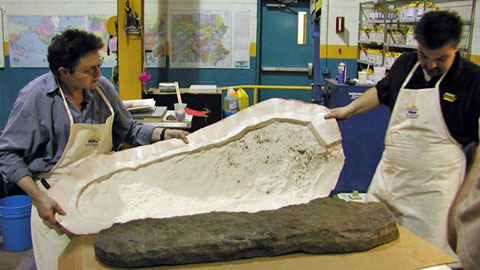
How To Reproduce a Native American Gravestone
Read how a reproduction of this historic headstone for display at a local museum is made using brush-on urethane rubber.
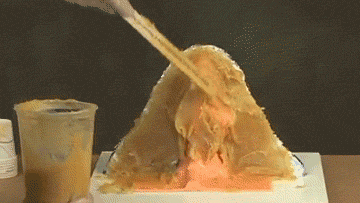
How To Make a Support Shell for a Brush-On Mold Using Plasti-Paste™
How to make a support shell for a brush on silicone mold using Plasti-Paste trowelable plastic.
